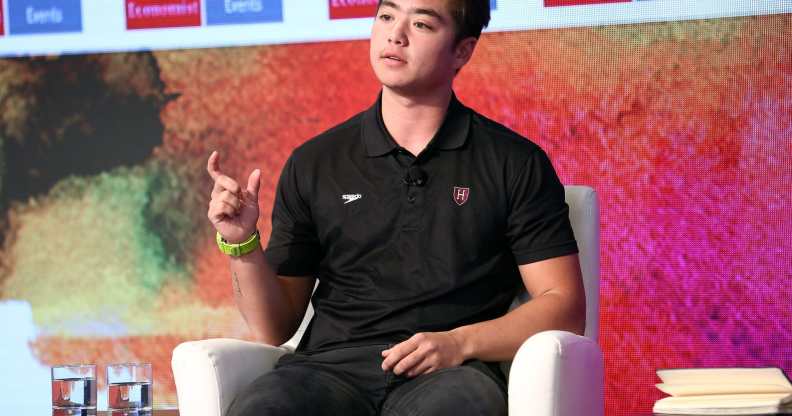Trans sports bans will ‘endanger all women’, explains swimmer Schuyler Bailar

NCAA Division I swimmer Schuyler Bailar speaks on stage at the 2nd Annual Pride & Prejudice Summit (Photo by Monica Schipper/WireImage)
Bans on trans women in sports aren’t about fairness, explains athlete Schuyler Bailar.
Bailar, who was the first trans man to compete in the National Collegiate Athletic Association’s (NCAA) top Division I, was disappointed by the International Swimming Federation (FINA) decision to effectively ban trans women from elite competition.
He was especially shocked at the stipulation that an athlete must have begun medical transition prior to the age of 12.
“Puberty can start anywhere between 10 to 14,” he told PinkNews. “Testosterone doesn’t peak for folks who are assigned male at birth (AMAB) until [their] early 20s, so it’s fascinating and confusing and disappointing that they chose that number.”
As Bailar pointed out, the age limit is especially difficult considering anti-trans legislation that makes it increasingly difficult to acquire gender-affirming care like puberty blockers.
“In the United States, we’ve got multiple bills banning [medical] transitions before age 18,” he said. “If you’re illegalising transition before 18 but mandating that you must have transitioned before 12, it’s a lose-lose scenario.”
Despite several FINA board members claiming that the decision was based on “what the scientists are saying”, Bailar is confused as to “what research they were pointing to.”

“There’s a really big problem with putting out rules right now on trans athletes because we don’t actually have robust research on trans athletes, why? Because we’re not allowed to play.
“Not a lot of us have actually competed at elite level sports because of the amount of discrimination we experience and now, because of FINA’s new rule, we will not be allowed to compete.”
Oftentimes, regulations like FINA’s new policy are implemented under the notion that they protect women’s spaces.
However, Bailar says the policy “will endanger all women”.
“People will say ‘well, this is just about fairness’, but it’s not. It’s about concentrating power in the white, cisgender, straight male elite,” he said.
“It enforces the policing of the women’s category and women’s bodies in order to exclude the trans ones – you have to police the category in order to exclude trans women.”
After the approval of the policy – which passed with 71 per cent of the vote from 152 members – FINA said that this was “only a first step towards full inclusion” for transgender athletes.
One of these steps to is the creation of an “open category” which would welcome gender-diverse individuals.
Not only does Bailar disagree with this concept, but he believes the language that the international swimming body is using is “ridiculous”.
“I think it’s quite manipulative and inaccurate to call it an inclusive policy because it’s exactly the opposite,” he said.
“It’s manipulative to call this the ‘gender-inclusive policy’ because it’s quite literally the opposite. Saying that ‘we’ll put you in this other category’, that’s exactly the definition of the opposite of inclusion.”
To help educational institutions and workplaces with gender literacy, Bailar has created the LaneChanger program – a course where he uses his experience and expertise to explain parts of gender identity that aren’t necessarily clear to everyone.

“I was the first openly trans athlete in D1 men’s sports in the US and when I started speaking about my experience, I was giving speeches, I was giving training, I was giving consulting information to folks and it started slow, but then it was a lot,” he recalled.
After the demand became too much for Bailar, he created the program to “reach more people.” His seminars tackle various foundational questions that better create understanding for the community, from how to be a better ally to how biological sex isn’t binary.
The results are readily apparent, too. Over the course of his career as an advocate, Bailar has seen hearts and minds change through contact with a trans person alone. He explained that sometimes it’s education that breeds understanding.
“I’ve actually given over 400 speeches over the years,” he continued. “One time, I was in the middle of nowhere – I think it was Kansas – I spent like a week there giving speeches, and a woman, she was this older woman with a purple shawl, she raised her hand and she said, ‘I want to help people kind of like you, like, I want to be helpful to people like you,’ and so I said, ‘You want to be an ally!'”
Often, people aren’t perfect ally material just yet, but have taken the first step, which is what Bailar feels is important.
“This has happened many times ,” he recalled. “I had presented only to athletes at this college, and one of the guys came up afterwards and he said: ‘You know Schuyler, before I came here I was nervous. I didn’t want to come but I had to because my coach made me. Now I’ve met you and you’re just like me. We’re both just, like, athletes and actually, I’ve had similar struggles to you, like, I get it.’
“The point is that he connected, and he was able to see himself in my story. There’s a common humanity that most people don’t recognise until they sit right in front of me and see that humanity.”

But it’s not just about helping allies for Bailar. Mostly, it’s about reassuring trans athletes who are being restricted from their sport of choice. When asked what he would say to a trans athlete currently struggling, Bailiar said: “I’m sorry.
“I am so devastated that this is how people feel and I’m more devastated that their feelings are in line with the rules. I’d start by validating that this is a really hard space to be in right now. I don’t want to gaslight them and tell them that it’s better when it’s not.
“I do believe that we’re going to get to a place that’s better, I really believe that, and I have no doubt that we will work through this eventually.”

